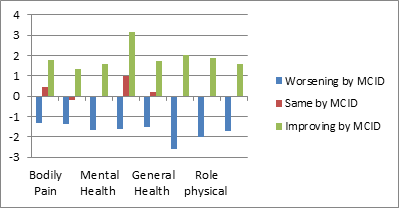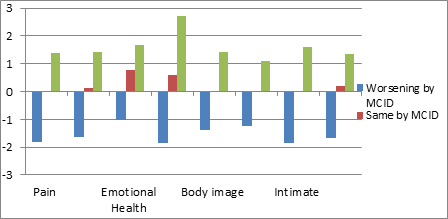Session Information
Date: Wednesday, November 16, 2016
Title: Systemic Lupus Erythematosus – Clinical Aspects and Treatment VI: Quality of Life
Session Type: ACR Concurrent Abstract Session
Session Time: 11:00AM-12:30PM
Background/Purpose: SF-36 and LupusQoL are Health-Related Quality-of-Life (HRQoL) questionnaires used in SLE. We determined: (1) concurrent construct validity of SF-36 and LupusQoL against disease activity in patients with moderate-to-severely active lupus and (2) intra-individual responsiveness and its magnitude for both questionnaires’ domains.
Methods: 99 active SLE patients [SLEDAI-2K ≥6] were recruited from a single centre. Patients completed both questionnaires at baseline and follow-up visits. Questionnaires’ domains scores were correlated with SLEDAI-2K and evaluated for floor/ceiling effects. Anchors for responsiveness were defined by: 1-Minimal Clinically Important Difference (MCID) definitions of SF-36, 2-MCID of LupusQoL and 3- SLEDAI-2K. Each of these anchors grouped patients as improved, same, or worsened. The magnitude of change was measured with Standardized Response Means (SRMs).
Results: In the 99 patients, SLEDAI-2K was 7.7±5.2 at baseline and 6.5±4.8 on follow-up at 4.7±3.1 months. SLEDAI-2K did not correlate with questionnaires’ domains confirming that HRQoL is an independent domain not associated with disease activity. Correlations among “comparable” domains of both questionnaires ranged from 0.70-0.79. Floor effect was present in 2 SF-36 domains (Role Emot, Role Phys). Ceiling effect was present in 4 SF-36 domains (Bod Pain, Role Emot, Role Phys, Social Funct) and 3 LupusQoL domains (Pain, Planning, Intimate Relat).
Conclusion: In active lupus patients, both SF-36 and LupusQoL are responsive to change with large SRMs in improving and worsening patients. Lupus-specific domains in LupusQoL (planning, burden to others, body image and intimate relationships) showed large SRMs. SF-36 and LupusQoL are acceptable questionnaires for monitoring HRQoL in patients with SLE. 


To cite this abstract in AMA style:
Nantes S, Su J, Touma Z. Responsiveness and Its Magnitude in the 36-Item Short Form Health Survey and the Lupus Quality of Life Questionnaire in Patients with Active Disease [abstract]. Arthritis Rheumatol. 2016; 68 (suppl 10). https://acrabstracts.org/abstract/responsiveness-and-its-magnitude-in-the-36-item-short-form-health-survey-and-the-lupus-quality-of-life-questionnaire-in-patients-with-active-disease/. Accessed .« Back to 2016 ACR/ARHP Annual Meeting
ACR Meeting Abstracts - https://acrabstracts.org/abstract/responsiveness-and-its-magnitude-in-the-36-item-short-form-health-survey-and-the-lupus-quality-of-life-questionnaire-in-patients-with-active-disease/
